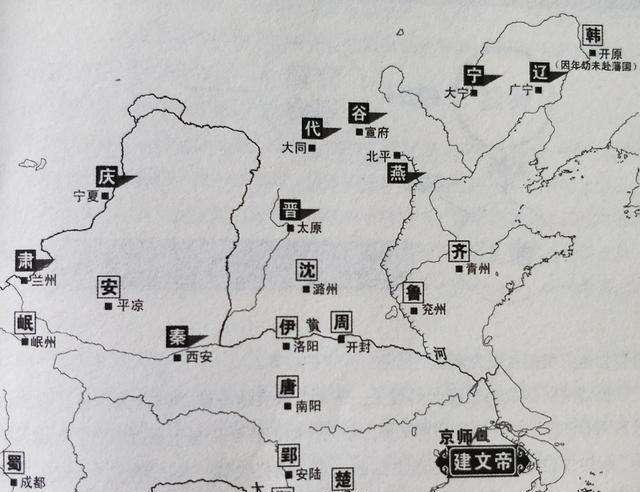After Zhu Yuanzhang established the Ming Dynasty, he decided to adopt the sub-feudal system, which was opposed by the Qunchen, and the drawbacks of the sub-feudal system were very obvious, and there were many such examples, which not only had an impact on stability, but also made the successor very painful.
However, Zhu Yuanzhang still implemented the system of sub-sealing and divided his sons throughout the country. Zhu Yuanzhang not only made his sons the king of the domain, so that they could have no worries about food and clothing, but also gave each son a part of the military power. The main purpose of his doing this was to suppress local rebellions or rebellions by central power ministers, and in Zhu Yuanzhang's view, there were many rebellions by powerful ministers in history, which was to prevent the occurrence of the situation.

The sub-feudal system lasted until the end of the Ming Dynasty. However, in the Chongzhen Dynasty, Daming was worried about internal and external troubles, and these clan kings could not help at all.
At the end of the Ming Dynasty, these clan kings were almost lambs to be slaughtered, let alone help, and it was already very good to be able to take care of themselves. Besides, they were the key targets of the rebels, after all, many of the clan kings were still very wealthy in their hands. However, when Chongzhen borrowed money from them, these people cried poorer than one another. However, there are exceptions, such as the King of Zhou who took out his family wealth at that time and the soldiers and civilians of Kaifeng stayed in Kaifeng for a long time.
So why, during the peasant revolt at the end of the Ming Dynasty, no one in the big and small clans could help?
Zhu Yuanzhang had the idea of dividing the feudal lords of the domain, in fact, he wanted to firmly grasp Jiangshan in the hands of the Zhu family, even if he died, there were sons and grandsons, anyway, Jiangshan would always be surnamed Zhu. Coupled with Zhu Yuanzhang's suspicious personality, he did not trust the chancellor, and his son was related by blood after all, so he would be loyal to himself or the old Zhu family. It is an attempt to use the blood ties and foundations of the seven great aunts and eight great masters as a link and foundation, and to use the kings of the divided seals to defend the capital division in times of crisis.
Zhu Yuanzhang's careful thinking is understood by everyone, but the ideal is good, and the reality is very bone-chilling.
First of all, the first point is that the kings of the domain after Zhu Di are very different from those in Zhu Yuanzhang's time. After Zhu Di launched the Battle of Jingnan to seize the throne, he also began to cut the domain, but he was not as eager to make quick gains as Zhu Yunjiao, but after Zhu Di's cutting of the domain, the kings of the clans everywhere had almost no military power in their hands, this was fatal, there was no military power, what rebellion to take, on the other hand, what arch to defend the center.
This is also one of the most fundamental reasons why at the end of the Ming Dynasty, these feudal kings could not take care of the imperial court.
Another reason, Zhu Yuanzhang ignored a big problem, these clan kings with the surname Zhu had feelings for Daming and the old Zhu family, but they did not know about the imperial court. Even if it is possible to rely on the sub-feudal descendants to maintain rule for a period of time, but over time, after so many generations of development, especially after the weakening of blood relations, it can be said that it has long been unable to fight with the eight rods of the imperial court, and even if it is capable, I am afraid that it will not save the imperial court.
Of course, at the end of the Ming Dynasty, not all the kings of the clan were indifferent. The only Tang king who raised an army to prepare to go to Beijing to serve the king, was arrested by Chongzhen halfway through the road and imprisoned in the imperial prison in Fengyang.
The reason why Chongzhen was like this, on the one hand, did not have the slightest trust in the king of the domain, in his eyes, the king of Tang was not to qin the king, but to replace himself. Therefore, Chongzhen ordered him to return, of course, and more crucially, the Ming Dynasty was extremely strict with the king of the domain. Even if the king of the clan had no military power, he did not loosen his control over him. According to the regulations of the Ming Dynasty, the king of the clan could enjoy himself in the palace, but he could not raise troops and leave the clan. Therefore, no matter what the Tang King came to do, the purpose was pure or impure, which Chongzhen did not allow.
At the same time, we have to say that the imperial court started from Zhu Yuanzhang, and one generation is not as good as a generation, otherwise it would not have been full of wolf smoke in the Chongzhen Dynasty. Then the king of the clan is actually the same, the enjoyment of several generations has long worn away the sharpness of the body, many of the clan kings are just coveting pleasure, by the end of the Ming Dynasty, they are no longer the power of the imperial court to resist external humiliation and suppress internal rebellions, but have become a burden.